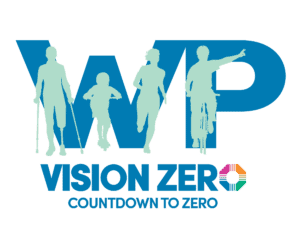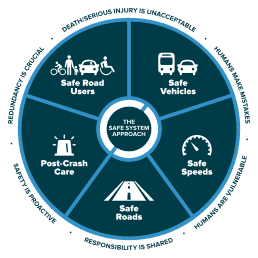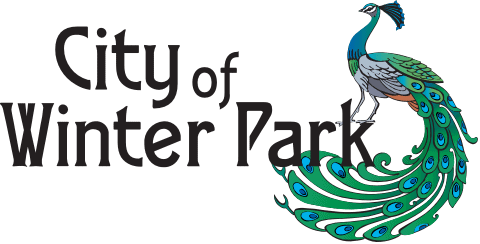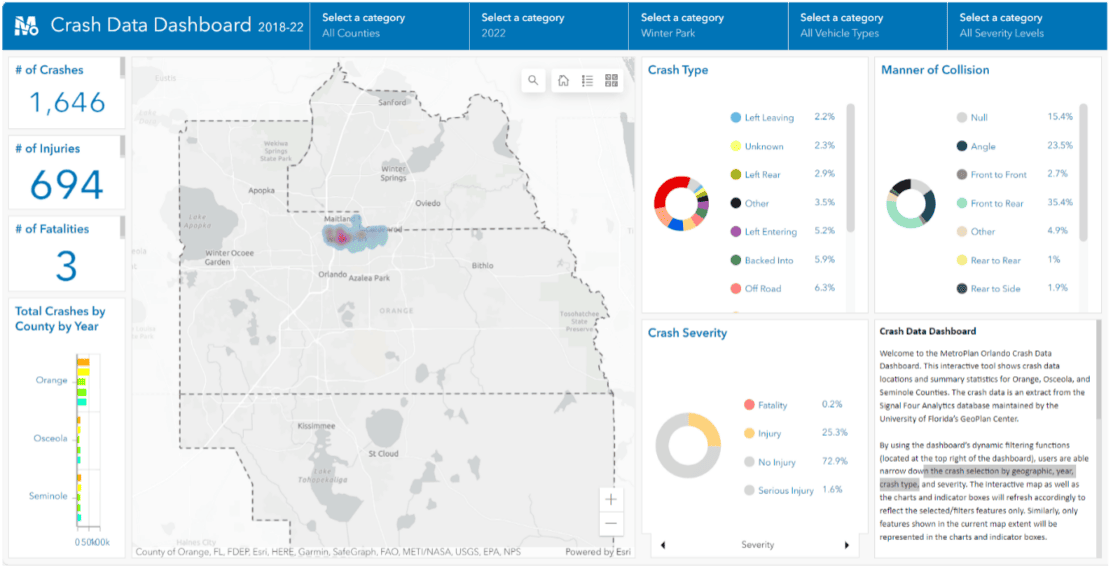The Winter Park Vision Zero Action Plan is part of a regional effort by MetroPlan to reduce traffic fatalities and severe injuries, creating safer roads for both the 2.2 million residents and 75 million tourists who visit central Florida annually. Coordinated Vision Zero Action Plans will be created for cities and counties throughout the region made possible by a $3.79 million federal Safe Streets for All (SS4A) grant.
Why Vision Zero?

- The Orange-Kissimmee-Sanford metro area continues to rank as one of the deadliest areas, with the average yearly deaths continuing to rise. (Dangerous by Design, 2022)
- In 2022, there were three fatalities and 26 severe injuries on Winter Park’s roadways. (Signal 4 Analytics)
- Vision Zero seeks to eliminate traffic fatalities and severe injuries on the transportation system by providing a proactive and preventive approach.
- Vision Zero believes loss of life is not an acceptable price to pay for mobility.
- The goal of Vision Zero is to integrate safety principles during the planning and implementation of transportation programs citywide.
Taking Action with Vision Zero
Our Vision Zero brand
The Vision Zero brand helps to generate visibility and familiarity in an effort to achieve campaign participation community wide. The Winter Park brand is easily recognizable, incorporating the character of the city into the larger vision zero goal: to reduce the number of fatalities and severe injuries on the transportation system to zero by 2050.
MetroPlan’s Interactive Crash Dashboard
The crash data dashboard provides a comprehensive view of crash data, including type, severity, manner of collision, and overall injury and fatality trends for the given period. The Winter Park dashboard is provided through MetroPlan’s regional dashboard, which relies on the Signal Four Analytics database maintained by the University of Florida’s GeoPlan Center.
Access MetroPlan Orlando Crash Data Dashboard.
Help identify safety issues
Sometimes crash data doesn’t tell the whole story – and that’s where you can help make transportation safer! The High Injury Network map below shows the worst roads for crashes, deaths and serious injuries. By focusing safety projects on these roads, we can save the most lives.
(Include Winter Park Map of High Injury Network)
How can you help?
You can use the map below to identify problem areas. We’re especially interested in experiences you have on or near the High Injury Network. You can also identify other areas where you feel unsafe traveling.
Help Identify Safety Problems | MetroPlan Orlando Regional Vision Zero (visionzerocfl.gov)
Vision Zero Action Plan
Access Vision Zero Winter Park Action Plan
Vision Zero Winter Park will create a comprehensive Vision Zero Safety Action Plan for the city including the following components:
- High Injury Network
Analyzing data to identify places on the transportation system with the highest risk for fatal and serious injury crashes so that we can focus on our most important problem areas. - Equity Component
Identifying and prioritizing efforts in areas of the community that are disproportionately affected by traffic crashes. - List of Priority Streets & Intersections
Producing a list of feasible projects that have the most safety impact for the region. - Educational & Enforcement Programs
Identifying key behavioral changes needed to reduce crashes and methods for encouraging those changes. - Sustained Effort
Establishing a defined process and identifying an organization responsible for carrying out, updating and monitoring progress.

Eliminating deaths on our transportation system requires an ambitious, proactive method called the safe system approach, which includes working on safer roads, safer vehicles, safer speeds, addressing the needs of all travelers, and strengthening post-crash care. All these elements work together to build layers of protection into the transportation system.
Project Schedule
The schedule below outlines the phases of Vision Zero Winter Park, including the dates and action items associated with each phase.
Working Group Meetings | Nov 2023 to Mar 2024
The Working Group Meeting phase will continue throughout creation of the Vision Zero Action Plan. Working Group members will assist with strategy development for the remaining phases as well as provide key input and advisement for the plan.
Public Engagement & Agency Collaboration | Nov 2023 to Feb 2024
Public engagement will take place throughout the course of the study. The main objective of the outreach effort is to build awareness, gather information, and support the plan’s success. The primary outreach efforts include:
- Three Online/Virtual Meetings [May include virtual town hall, virtual meeting room, online surveys, social media campaign, etc.]
- Three Pop-up Events
- Provide overview of the VZ project and summary of the baseline assessment.
Participants will provide feedback on maps that reflect results of the transportation safety analysis.
Identify High Injury Network & Collision Profiles | Nov 2023 to Dec 2023
The main objective of this phase is to identify roadways and intersections with the highest intensity of severe injuries and fatalities. The primary outcomes are listed below:
- High Injury Network development.
- Identify crash hot spots.
- Create collision profiles.
Policy Review | Nov 2023 to Dec 2023
The main objective of this phase is to review existing best practices and previous studies to identify barriers and opportunities for achieving vision zero goals. The primary tasks are listed below:
- Review of existing best practices guidelines and previous studies.
- Interviews with city staff.
- Review of Standard Operating Procedures to identify barriers and opportunities.
- Review of city guidelines.
Project Identification & Prioritization | Dec 2023 to Feb 2024
The main objective of this phase is to prioritize countermeasures and future work plan action items. The primary tasks are listed below:
- Review of proven safety countermeasures.
- Evaluate safety at specific locations.
- Outline opportunities to update operational processes for a city VZ program that is integrated with existing city plans.
- Provide a framework to implement future actions aligned with the CIP process.
Project Contacts
Jamel Hibbert
Transportation Manager





